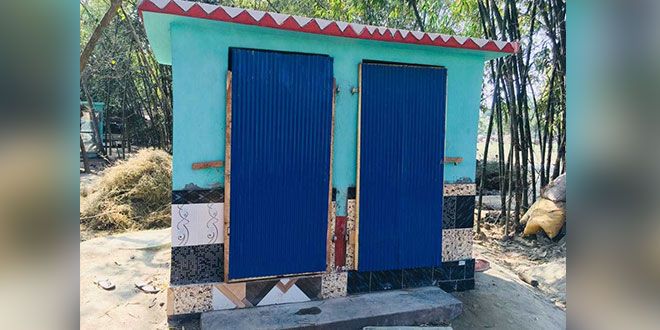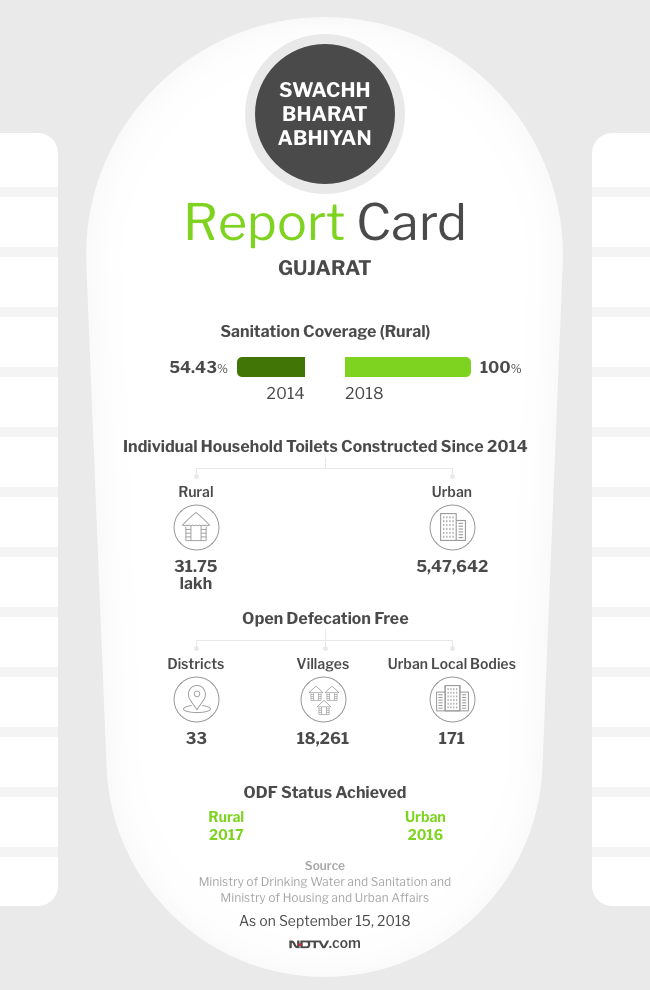New Delhi: In 2016, Gujarat was one of the earlier states to declare its urban areas open defecation free or ODF. The symbolism of the day the announcement was made, on Gandhi Jayanti on October 2, was not lost. Prime Minister Narendra Modi launched Swachh Bharat Abhiyan in 2014 and pegged it to Mahatma Gandhi’s Clean India vision and set the deadline of achieving Swachh India goals by the 150th anniversary of the Father of Nation. So it was only apt that the state which is the birthplace of Mahatma Gandhi also chose the same date to declare its urban areas ODF in 2016 and a year later chose the same date to declare its rural areas ODF. But, currently, state’s ODF claim for its rural areas is being questioned by Comptroller and Auditor General (CAG). According to a report that was tabled in the state Assembly recently, CAG said that as per their on ground surveys they found out that 30% of the houses in eight districts of Gujarat had no access to individual toilets. Moreover, in 36 out of 120 villages, the toilets lay unused due to unavailability of soak pits and an inadequate supply of water.
The report stated that their survey that was carried out in Banaskantha, Dahod, Dang, Chhotaudepur, Patan, Jamnagar, Junagadh and Valsad districts of Gujarat for the period of 2014-17, revealed that there are still households in these ODF declared districts that do not have access to toilets (individual or public). It further said that the administration had long ago given these districts an ODF Tag as per the targets set out in the baseline survey conducted in 2012 and since then they have remained uncovered and therefore does not have access to toilets. However, according to the Swachh Bharat Abhiyan, every household should have access to toilets and these households cannot remain uncovered and neither the state can declared itself ODF without including them.
Even a reply to the RTI query recently stated that Gujarat still has requirement of lakhs of toilets in rural households. The RTI query further stated that in Dahod, as of May-June this year, 1.40 lakh families are yet to get toilets under the ‘Swachh Bharat Mission- Gramin’ scheme. Moreover, 17,874 families in Vadodara, 26,687 in Chhota Udepur, 14,878 in Kutch, 34,607 in Sabarkantha, 27,180 in Patan, 19,526 in Mahisagar and 21,320 in Amreli districts do not have access to toilets at their homes.
To all these claims, Swachh Bharat Mission officials from Gujarat have to say is that these differences are expected to come up because of the branching out of families into separate units every single year.
The Official Numbers That Gave Gujarat The ODF Tag
According to the data provided by the Ministry of Drinking and Sanitation and Ministry of Housing and Urban Affairs dashboard, Gujarat has around 171 cities, more than 18 thousand (18,676) villages and 33 districts that are officially verified free from the age-old practice of open defecation. Whereas, till date, more than 31 lakh (31,75,691) individual toilets have been built in the rural areas of the state and more than 5 lakh (5,47,642) toilets have been built for 54 lakh urban families, who did not have a toilet as per the report released by the state government.
Gujarat Aims For ODF Plus And ODF Plus Plus

Despite CAG raising doubts on state’s ODF status, authorities give a green flag to efforts for making Gujarat a ODF Plus and ODF Plus Plus state
Despite the questions being raised, since Gujarat has been certified as an ODF state, the authorities have already green flagged efforts to move towards the next stage – ODF Plus and ODF Plus Plus targets that mainly aim at sustainability of ODF tag, adequate liquid water supply, improved sewerage lines, storm water drains and pucca cement roads. Talking to NDTV about the same, a senior swachh rural official from Gujarat said,
We are reviewing the ODF tag and the claims put by CAG report on the state. Soon we will be able to roll out details on the same and prove that Gujarat has successfully achieved the open defecation free status.
The officer further said,
We are also in the process of moving towards ODF Plus and ODF Plus Plus guidelines. According to the Swachh Bharat Abhiyan government standards, the chain to Swachh India is to first attain the ODF status that means give access to toilets at an individual level, followed by ODF plus that refers to sustainability of ODF tag by ensuring proper functionality, cleanliness and maintenance of the toilets and lastly move towards ODF Plus Plus protocol that focuses on achieving sanitation sustainability by addressing complete sanitation value chain, including safe and complete fecal sludge management. Gujarat has successfully climbed the first ladder, soon we will prove it as well. In the coming years, we aim to meet ODF plus and ODF Plus Plus targets as well.
Highlighting the activities Gujarat is following to achieve the ODF plus tag, the officer added,
We have deployed nigari samitis (Surveillance Squads) in each of the rural areas. Their work is to go out daily, both in the morning and night and do field surveys and ensure no one in their area is defecating in the open. Secondly, through Information, Education and Communication (IEC) tool, we are making people aware about the benefits of using a toilet and why they should use it instead of going out in the open. We also have special training on the toilet maintenance and cleanliness techniques, so that no one can turn around and say, the toilets are not hygienic enough to be used by the villagers.
Another step the rural areas of Gujarat have taken is the introduction of the concept of ‘R-urban’ – a term coined by Prime Minister Narendra Modi to make rural areas equipped with urban facilities. The work under this scheme was kick-started last year only and as a pilot project, 3,311 villages were selected that got two separate systems for disposals of solid waste and wet-dry garbage, which was further utilised for the purpose of recycling and making compost fertilizer. The particular step was taken to make villagers understand how they can make money through effective waste management.
From Rural Areas To Urban Regions
In July this year, Gujarat Chief Minister Vijay Rupani unveiled the ‘Urban Sanitation and Cleanliness Policy’, wherein the government targets things such as making Gujarat a zero-waste state by 2023, rehabilitate the state’s manual scavengers and achieve the ODF plus status.
Highlighting the details of the policy and how urban Gujarat plans to move ahead, Anand Zinzala, Joint Secretary, Urban Development and Housing Department said,
Our priority first is to reduce the generation of waste by encouraging segregation in households, resident welfare associations and bulk waste generators like malls and hospitals. Once we achieve the target of 100 per cent waste segregation at source, we plan to move away from the concept of landfills and move forward towards effective waste management systems wherein the waste can be utilised successfully.
Mr Zinzala further said that under the new policy the state has set a goal to make all Gujarat cities zero waste within the next five years and for now eradicating manual scavenging from the state has been taken up as an absolute priority. He also said that the government has asked the civic body to ensure that individual households are encouraged to practice sewage water recycling so that water wastage can be checked.
Along with these crucial steps, the new policy of Gujarat’s urban development is in line with the ODF plus status as defined under the Swachh Bharat Abhiyan guidelines.
Innovative Steps Taken By Gujarat To Reduce Waste
During World Environment Day celebrations this year, Gujarat’s largest city Ahmedabad imposed a ban on plastic items such as water pouches, plastic tea cups, single-use plastic carry bags and paan masala packets, committing itself to United Nations’ goal of beating plastic pollution. To make the ban successful, Ahmedabad Municipal Corporation had launched a series of awareness drives along with a toll-free number (155303) on which people could place their request to collect banned plastic items from their houses.
Also Read: Ahmedabad To Commemorate Gandhi Jayanti By Declaring The City Free Of Community Garbage Bins
From Ahmedabad to Rajkot, the local civic body of the city has installed Global Positioning System (GPS) on their 300 garbage collection vehicles to effectively manage the issue of irregularities in garbage collection services. For this, the Rajkot Municipal Corporation (RMC) has marked more over 5,000 spots for garbage collection and over 200 routes have been identified for the trucks.
Whereas, in diamond city Surat, the city corporation has explored a new technology and installed underground waste bins in order to end open dumping. The underground waste bins are in a size of 3 cubic metres and each bin can hold upto 1.5 tonnes of garbage, these bins have special sensor-fitted inside them that help in ending open dumping by keeping the garbage out of sight. These smart bins send alerts to the officials once 70 per cent of the bin is full to prevent garbage overflow.
Till date, Surat Municipal Corporation has installed 43 of these smart bins in the public areas of the city.
Also Read: Gujarat’s New Waste Management Policy: From Zero Waste By 2023 To ODF Plus Status
Gujarat’s Swachh Survekshan 2018 Status
This year, Gujarat’s performance in Swachh Survekshan saw a dip as the state was ranked as India’s 17th cleanest state from the earlier rank of 11. A total of 30 cities from Gujarat participated in the survey, but none out of them managed to be in the list of top 10 cleanest cities of India. Apart from Ahmedabad, which improved its rank from 14 in 2016 and 2017 to 12 in 2018, no other city from the state showed much improvement.
With the new urban policy in place, now we will aim to improve the Swachh Survekshan rankings in 2019. By then, we hope to up the swachh game in the urban regions of the state by improving the waste management and treatment system drastically, added Mr Zinzala.
Also Read: Gujarat’s Major Cities Except Ahmedabad See A Fall In Their Ranking In Swachh Survekshan 2018
NDTV – Dettol Banega Swachh India campaign lends support to the Government of India’s Swachh Bharat Mission (SBM). Helmed by Campaign Ambassador Amitabh Bachchan, the campaign aims to spread awareness about hygiene and sanitation, the importance of building toilets and making India open defecation free (ODF) by October 2019, a target set by Prime Minister Narendra Modi, when he launched Swachh Bharat Abhiyan in 2014. Over the years, the campaign has widened its scope to cover issues like air pollution, waste management, plastic ban, manual scavenging and menstrual hygiene. The campaign has also focused extensively on marine pollution, clean Ganga Project and rejuvenation of Yamuna, two of India’s major river bodies.





























INDIAN
October 1, 2018 at 7:47 am
Slowly things improving……….Good Work INDIA…